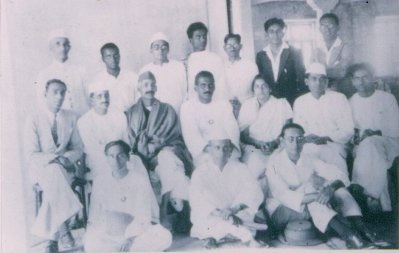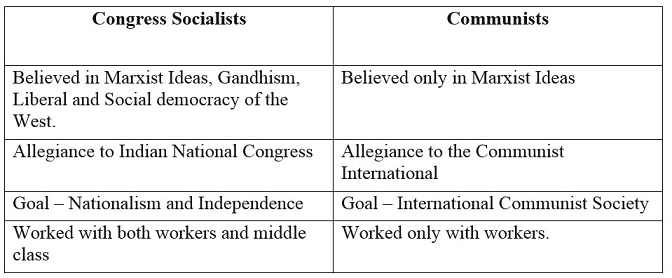Congress Socialist Party (CSP) – The Left Wing of INC

This topic of “Congress Socialist Party (CSP) – The Left Wing of INC” is important from the perspective of the UPSC IAS Examination, which falls under General Studies Portion.
What is the Congress Socialist Party (CSP)?
- CSP was a socialist group within the Indian National Congress (INC).
- It was founded in 1934 by socialists such as Jayaprakash Narayan and Acharya Narendra Dev.
What were the reasons behind the formation?
- After the suspension of the Civil Disobedience Movement in 1934, some Congress members decided to enter into legislatures and work for the Congress’ cause within the govt. They were known as Constitutionalists.
- Some socialists thought this would erode the revolutionary character of the Congress. So they had decided to form a socialist party within the Congress named Congress Socialist Party (CSP).
What were the beliefs/ideology of CSP?
- They believed in Marxist Ideas, Gandhism, Liberal and Social democracy of the west,
- Allegiance to Indian National Congress (INC),
- Nationalism and Independence was their goal,
- They joined hands with Bourgeois or Middle class,
- Bringing in workers and peasants so as to create a broad base for Congress,
- Abolition of capitalism,
- Abolition of zamindari system,
- Abolition of princely states,
- Incorporate radical socio-economic measures for the upliftment of distressed people into the Congress work programme.
How were they different from Communists?
Who were the Early Socialists?
- In the early 1930s, Socialists groups formed in Bihar, Uttar Pradesh, Bombay, and Punjab.
- In 1933 at Nasik jail, the idea of forming a socialist party within the Congress was floated by young socialists such as Jaya Prakash Narayan, Achyut Patwardhan, M.R.Masani, N.G.Gore, Ashok Mehta, S.M.Joshi, M.L.Dantwala.
- In 1934 at Banaras, Sampurnananda wrote a pamphlet which argued for the need for formation of the all-India socialist party as a congress wing.
- Jayaprakash Narayan wrote a book named Why socialism? – the relevance of socialism in India.
- Yusuf Meherally founded Bombay provincial youth league which played important role in demonstration againstSimonn commission and also participated in civil disobedience movement.
- Ram Manohar Lohia published a Journal named Congress socialist.
When was All India Congress Socialist Party formed?
- The first All-India congress socialists’ conference was convened at Patna by Jaya Prakash Narayan in May 1934 under the presidentship of Acharya Narendra Dev to deliberate on the formation of Party.
- The first All India Congress Socialist Party was formed in Bombay in October 1934 under the presidentship of Sampurnananda and Jayaprakash Narayan as the General Secretary. It was attended by delegates from thirteen provinces.
Objectives of CSP
- Independence (freedom from British rule) and socialism were the twin objectives of the Congress Socialist Party.
- For the attainment of Independence, the congress socialists joined hands with Anti-imperialists and non-socialists forces within in the Congress. Jaya Prakash Narayan said: “Our work within congress is governed by the policy of developing it into a true anti-imperialist body”. He also warned his co-workers in 1935: “Nothing should be done which may antagonise the genuinely nationalist elements and drive them to joined hands with the compromise-seeking right wing.”
- But the ultimate objective of the congress socialists was to establish a socialist society in India and they worked to secure the acceptance of their programme by the Indian National Congress.
What was the Work programme of CSP?
CSP adopted a comprehensive programme for the creation of a socialist society in India as follows
- Transfer of all power to the masses,
- Development of economy to be planned and controlled by the state,
- Socialization of key Industries such as railways, steel, cotton, jute etc.
- State monopoly of foreign trade,
- Organisation of cooperative societies for production, distribution and financing the unorganized sector,
- Abolition of titles with compensation for princes, landlords, and all other exploiters,
- Redistribution of land among the peasants,
- Cooperative and collective farming to be encouraged and controlled by the state,
- Liquidation of debts owned by peasants and workers,
- Recognition of Right to work or maintenance by the State,
- Equitable distribution of goods,
- Adult franchise on a functional basis,
- The State shall neither support nor discriminate between religions or castes or communities,
- The State shall not discriminate between the Sexes and
- Refusal to acknowledge the so-called the Public Debt of India.
What were CSP’s impacts on national politics?
Negative reactions from Nationalist leaders
- Gandhi rejected the ideas of property abolition, Class war, zamindari abolition, capitalism abolition and princely states abolition. Instead, they should act as trustees of workers, peasants and subjects.
- Nehru and Bose though socialists, never joined CSP
Positive reaction from National leaders
- Nehru appointed Acharya narendra dev, Jayaprakash Narayan and Achyut patvardhan in Congress working committee
- In 1936 faizpur session under the leadership of Nehru, the agrarian programme was approved which called for
- Reduction of land revenue
- Abolition of feudal levies and dues
- Cooperative farming
- Living wage for agricultural labourers
- Creation of Peasant unions
- In 1936, Indian National Congress asked congress ministries in provinces to work for safeguarding and promoting interests of workers
- CSP pushed Congress to join the democratic movement against princely state rulers for civic rights and responsible government.
CSP was dissolved in 1948.



GOOD CONTENT. KEEP POSTING MANY MORE